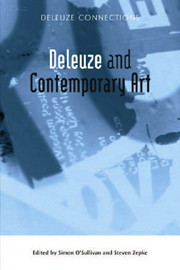Book contents
- Frontmatter
- Contents
- Acknowledgements
- List of Illustrations
- Introduction: Deleuze and Guattari and Contemporary Art
- POLITICS
- 1 The Politics of the Scream in a Threnody
- 2 A Shift Towards the Unnameable
- 3 The Heterogenesis of Fleeing
- 4 Anita Fricek: Contemporary Painting as Institutional Critique
- THE AESTHETIC PARADIGM
- SCENES AND ENCOUNTERS
- TECHNOLOGIES
- Notes on Contributors
- Index
3 - The Heterogenesis of Fleeing
from POLITICS
Published online by Cambridge University Press: 12 September 2012
- Frontmatter
- Contents
- Acknowledgements
- List of Illustrations
- Introduction: Deleuze and Guattari and Contemporary Art
- POLITICS
- 1 The Politics of the Scream in a Threnody
- 2 A Shift Towards the Unnameable
- 3 The Heterogenesis of Fleeing
- 4 Anita Fricek: Contemporary Painting as Institutional Critique
- THE AESTHETIC PARADIGM
- SCENES AND ENCOUNTERS
- TECHNOLOGIES
- Notes on Contributors
- Index
Summary
In everyday usage fleeing is something for cowards. The virtue of manfully throwing oneself with a weapon into the midst of a fight is opposed to the flight and withdrawal typical of a dishonourable attitude. In the hetero-normative everyday the sanctified mode of subjectivation for the honourable and manly fighter is a decision to take one of two sides, followed by a fight for the sublation [Aufhebung] of this division, and the final reestablishment of unity. Movement may only develop in this striated and stratified space between division and unity.
Yet within our narrow geopolitical-discursive space shaped by occidental-dialectical thought we find residues of a figure that affirms flight, cunning elusion and subversion, while evading the constraint of division and sublation. There are various recent approaches in philosophy, in political practice and in art production that have developed and tested a non-dialectical notion of resistance that goes beyond the concepts of contradiction, negation and reaction. These conceptual developments stretch from various figures of flight to nomadism, desertion and destitution, to disappearance, betrayal and diverse concepts of exodus.
I would like to draw out a specific genealogical line of this ensemble of conceptual creations which have gained special meaning in the last thirty years, not least in the field of art, where they – and this is what I wish to problematise here – have often been interpreted in an abusive manner.
- Type
- Chapter
- Information
- Deleuze and Contemporary Art , pp. 43 - 62Publisher: Edinburgh University PressPrint publication year: 2010



